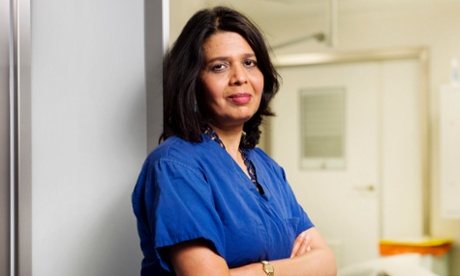
One thing’s for certain: media coverage of age and infertility is not much of an aphrodisiac. Unless you like having enforced reproductive sex at gunpoint to the ticking sound of a clock – which might be the average Boden catalogue subscriber’s idea of a turn-on (guilty), but is perhaps not so attractive to a single lady in her late 20s who is a long way off finding someone with whom she might want to have a takeaway, let alone a baby.
Screaming headlines from the weekend – “NHS Chief: Don’t Wait Until 30 to Have Baby” – are designed to evoke two responses: panic or anger. There’s no need for either, but there is something interesting going on here. Consultant gynaecologist Professor Geeta Nargund was trying to point out – not unreasonably – that the cost to the NHS of IVF treatments is rising steeply. Age-based infertility (rather than infertility that would exist regardless of age) is on the increase because it’s more socially acceptable, and indeed more possible, to delay motherhood than it was 30 years ago. This isn’t scaremongering, it is fact.
And it’s a fact that isn’t even really news, because most women already heed Professor Nargund’s advice without even realising: the average age of a woman giving birth in Britain is 30. But let’s be clear: Nargund is sounding a warning about the NHS – not about getting pregnant. Possibly the women she refers to who require fertility treatment in their late 30s or early 40s would not have shown up in statistics in times gone by – they would have just not tried to have children. Or they would have tried and given up.
Now they have recourse to a solution; but IVF is expensive and requires an average of four cycles to work – at roughly £5,000 a cycle, if it’s on the NHS – and the more that women “delay” their childbearing years (whether by design, accident or life circumstance), the heavier the demand for IVF.
The NHS alone doesn’t carry all this demand: it only funds 41% of the IVF cycles in England and Wales, with more than half of people paying to sort out the problem for themselves – or at least trying to sort it out. The IVF success rate for women under 34 is around 40%, falling to 21% from the age of 40. All Professor Nargund was trying to say is that it would be helpful for the NHS if society could be set up in such a way that more people rely on natural fertility. Why is it taboo to say this? It’s surely important that we do – especially when the fertility industry is an industry that sells hope. And sometimes that hope is false.
The problem here is that media coverage of fertility is more often panicked and generalised, illustrated with individual stories of fortysomething “career women” undergoing expensive rounds of IVF or, conversely, “miracle” fortysomething first-time natural conceptions. The reality is: the fertility of every woman is specific to her and her life situation. The average doesn’t predict your fertility (or infertility). Neither does someone else’s story.
There is, however, a very large grain of truth in the hysterical coverage of how long women have, or don’t have, to conceive. In general terms, taken as an average across the entire population, women will find it easier to get pregnant when they are under the age of 30. Guess what? An average man will also find it easier to impregnate a woman the younger he is. No one ever mentions this, but it’s true. The younger we are, the healthier we are, and the more fertile we are. Despite all the laudable advances in the fertility industry, why pretend things are otherwise?
It’s entertaining that this incontrovertible fact of life is headline news. Or maybe we are finally starting to admit to ourselves that advanced fertility techniques are, at best, designed to benefit a minority. At worst, they are expensive empty promises. Ten years ago, when I was researching an article on egg freezing – then the latest holy grail – a leading fertility specialist in Italy told me something I have never forgotten: “The idea of postponing a pregnancy because it is not accepted in your workplace when you are 30? That is something really violent towards women.”
In a decade, not much has changed. Why do we keep trying to change the reality of biology, something that is incredibly difficult and expensive to alter? Instead, we could be adjusting something easy and free to change: social and cultural attitudes. We need to discuss why some women “delay” childbirth, especially as often the supposed “delay” is unconscious or even unwanted – especially if you can’t meet the right person. In some cases, it’s down to work and money, as many women think it’s better to wait and be settled professionally. But age does not make it easier to combine work and family. And why should it? Having a family should be an achievable goal at any age.
Instead of it becoming easier for women to meet someone, and work, and have kids (not exactly a wild ambition), this idea has sprung up: “Don’t worry! You can freeze your eggs and have IVF! Hang on in there!” This is ridiculous and is working for precisely no one. I do not want to say that a headline screaming “Don’t Wait Until 30!” to would-be mothers has a point. But it does.

